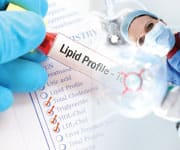Life Extension Magazine®
In a matter of just 40 seconds or so, one person in the United States will suffer a heart attack.1 That adds up to nearly 90 heart attacks every hour.
After years of accepting high death rates from cardiovascular disease, an advance has occurred in therapeutic prevention.
According to prominent Miami cardiologist Michael Ozner, M.D., we are standing on the brink of a revolution in the way we treat coronary heart disease.
This change is so profound that Dr. Ozner thinks we might finally "have the ability to take the majority of heart attack risk off the table."
How is this possible?
It's all thanks to a new understanding of what causes coronary heart disease—and an explosion in new treatments that will be used in the battle against this formidable enemy.
With these treatments, we may also be able to not only prevent atherosclerotic plaques from forming, but stabilize and reverse plaques that already exist. This reduces a major cause (coronary atherosclerosis) of heart disease.
What you need to know
Many people understand that low-density lipoprotein (LDL) cholesterol is a major contributor to heart disease, but accurately assessing heart-disease risk requires more in-depth analysis. Clinical trials are revealing a greater decrease in heart disease risk in new medications that additionally target risk factors such as apolipoprotein B and C-reactive protein.
A healthy lifestyle is the first step to preventing heart disease, but many additional steps must be taken, according to Dr. Ozner, author of the best-selling book, The Complete Mediterranean Diet, and world leader in cardiology.
It's the Lipoproteins

Coronary artery disease occurs when cholesterol-carrying lipoproteins enter the artery wall and are then retained and oxidized. When this happens, immune system components enter the vascular wall and engulf these dysfunctional lipoproteins.
This process eventually leads to an atherosclerotic plaque, which can be thought of as a "pimple" in the artery wall. If the plaque ruptures, a clot can form and block the coronary artery, causing a sudden heart attack.
Contrary to what many people think, the problem isn't cholesterol itself. Instead, it's the lipoproteins that carry cholesterol. These lipoproteins come in different densities and sizes. The most potentially dangerous lipoproteins are low density lipoproteins (LDL) and remnant lipoproteins.
"Lipoproteins are like little taxi cabs in the circulation carrying cholesterol and triglyceride molecules to destinations where they are needed," says Dr. Ozner, medical director of Wellness and Prevention at Baptist Health South Florida and author of multiple best-selling books on heart disease.
"If there are too many lipoproteins, they can penetrate the arterial wall. And once they get inside, they can become engulfed by macrophages leading to plaque development. If we can reduce the number of potentially harmful lipoproteins that enter the vascular wall in the first place, it will reduce the number of plaques that can rupture and cause heart attacks."
Researchers are making advances on multiple fronts to reduce the number of dangerous lipoproteins and to shrink or stabilize existing plaques. Recent studies are showing a significant impact in cardiovascular disease with a reduction in heart attack and stroke.
Proven Ways to Stabilize and Shrink Arterial Plaque
When it comes to any discussion about reducing the risk of heart attack and heart disease, Dr. Ozner is adamant on one point: It always begins with following a healthy lifestyle.
We already know that following a prudent lifestyle dramatically reduces the risk of suffering from heart disease. This includes limiting sugar, refined starch, and saturated and trans fats while avoiding processed food, smoking, and excess alcohol. Staying physically active, reducing stress, and getting sufficient sleep are likewise important.
Dr. Ozner is also a proponent of the Mediterranean diet, which focuses on consuming healthy fats, whole grains, omega-3-rich fish, and a wide variety of fruits and vegetables. He believes in it so strongly he wrote the best-selling book, The Complete Mediterranean Diet.
A recent meta-analysis of published studies found that eating a Mediterranean diet significantly reduces coronary artery disease, heart attack, and stroke.2
The Importance of Proper Blood Testing
In order to combat heart disease, it is critical to have your blood tested regularly to correct metabolic disturbances that can lead to heart attacks.
Standard cholesterol blood testing often leaves hidden risk undetected, says Dr. Ozner. For a more complete picture, it is important to also measure atherogenic lipoproteins, namely apolipoprotein B (or apoB for short).
It is also important to detect the level of chronic inflammation that, when elevated, is highly damaging to the heart and blood vessels. A low-cost way of measuring this is with a high sensitivity C-reactive protein (CRP) blood test.
"You can have normal LDL-C (cholesterol) levels, but high levels of apolipoprotein B," Dr. Ozner says.
In other words, you can have normal LDL-C levels and think you are healthy, but unless you know your apolipoprotein B levels, you may be at increased risk of heart attack.
These tests (apoB and hs-CRP) give a much better assessment of heart attack risk than a standard lipid profile alone. Dr. Ozner recommends measuring apoB blood levels in addition to a standard lipid (cholesterol and triglyceride) panel.
When Lifestyle Isn't Enough

For some people, a healthy lifestyle isn't enough to keep their levels of dangerous lipids and lipoproteins low. This includes people with a genetic predisposition to high cholesterol and lipoprotein levels. This group of men and women should be prescribed statin drugs to lower LDL cholesterol levels and further reduce the risk of heart attack.
But some particularly difficult responders still cannot reach their goals despite a healthy lifestyle and statins. For those cases, researchers are exploring novel pathways to slash the level of dangerous blood lipids and lipoproteins. The early trial results of these new therapies have been very encouraging.
To be clear, these therapies are for those who are unable to reduce their risk of heart attack or stroke through lifestyle modifications. Medicine has targeted this group of difficult responders to significantly lower their heart attack risk.
Let's consider five of the most promising therapies.
PCSK9 Inhibitors
PCSK9 inhibitors are a new class of drug that has been shown to lower LDL cholesterol dramatically—driving it down to levels below 50 mg/dL when given in conjunction with a traditional statin.
These drugs work by inactivating a liver protein called proprotein convertase subtilisin/kexin type 9 or PCSK9.
By inhibiting the activity of PCSK9, there are more liver receptors available to clear cholesterol-containing LDL particles from the bloodstream, thereby leading to a decrease in LDL levels.
The potential of these drugs was shown in the GLAGOV trial. This trial examined the ability of one of the leading PCSK9 inhibitors (evolocumab), brand name Repatha®, to lower cholesterol in patients already taking statins. This large double-blind, placebo-controlled study enrolled patients from almost 200 hospitals around the world.
The addition of Repatha® to statin therapy led to significant plaque regression as well as reduced LDL-C levels. Some patients' LDL-C levels fell to less than 50 mg/dL.3 These results were published in the Journal of the American Medical Association in 2016.
Next came the 2017 FOURIER trial, a highly anticipated clinical trial that was presented at the March 2017 American College of Cardiology annual meeting.
With more than 27,000 participants in this study, FOURIER connected the dots by showing that the combination of Repatha® and statins not only lowered LDL cholesterol by approximately 60%, but also significantly reduced the risk of heart attack and stroke compared to statin therapy alone. Researchers in this trial reported LDL levels as low as 30 mg/dL.4
Finally, the EBBINGHAUS trial examined the relationship between long-term PCSK9 use and cognitive function. Researchers found that Repatha® had no adverse effect on cognitive function—even among patients who experienced LDL levels below 25 mg/dL.5 These results were also presented at the 2017 American College of Cardiology conference.
High cost is a major drawback to widespread acceptance of PCSK9 inhibitors. Currently, the annual cost of Repatha® is about $14,000.6 Only a few insurance programs cover some of this high cost.
This is where the drug inclisiran enters the picture. Inclisiran offers a potentially less expensive approach that also reduces the activity of PCSK9.
Inclisiran

Inclisiran causes the liver to produce less PCSK9. Although the drug is still in Phase 3 clinical trials, the early results are promising, and its safety profile has been good.
In a 2017 study published in the New England Journal of Medicine, researchers reported on a double-blind, placebo-controlled study of 501 patients with high LDL cholesterol. Patients received either a single injection of inclisiran, a two-dose inclisiran injection (at day one and day 90), or a placebo and were tracked for 240 days.
Once again, patients experienced a profound reduction in LDL cholesterol. After a single injection, researchers noted LDL reductions of up to 41.9% after six months. Patients who received two doses experienced a 52.6% drop in LDL levels, with some patients achieving LDL levels below 50 mg/dL.7
One of the main advantages of a drug like inclisiran, says Dr. Ozner, is its ease of use. It appears that patients would only need to get one injection every six months to manage their cholesterol and atherogenic particle number. This would result in improved compliance and hopefully a cost savings.
Ezetimibe
Ezetimibe (Zetia) lowers cholesterol by blocking cholesterol absorption in the intestines. It also lowers dangerous apo-B.
In the landmark IMPROVE-IT trial published in the New England Journal of Medicine, ezetimibe lowered LDL cholesterol in high-risk patients when added to optimal statin therapy—and importantly, further reduced the risk of heart attack.8
Bempedoic Acid

Another tool in this emerging arsenal is bempedoic acid. This once-daily pill works in the liver to prevent cholesterol formation by inhibiting a key enzyme called ATP citrate lyase.
Early clinical trials have shown that bempedoic acid doesn't have the same risk of muscle-related side effects as statins, can be used in conjunction with statins, and results in a significant reduction in LDL cholesterol and particle number.9-11
Canakinumab
In the recently reported CANTOS trial,12 patients with a history of heart attack and a hs-CRP level of 2 mg/L or more were randomly assigned to canakinumab or to placebo.
Canakinumab significantly reduced hs-CRP levels from baseline, as compared with placebo. It also resulted in a significantly lower incidence of recurrent cardiovascular events (heart attack and stroke) than placebo.
According to Dr. Ozner, this trial further confirms that inflammation plays a causal role in atherosclerotic heart disease—and if lowered, helps reduce heart attacks and strokes.
Summary

Preventing heart disease begins with a healthy lifestyle. But for those who are unable to achieve an optimal level of lipids and lipoproteins despite lifestyle modifications, medications are necessary to ward off the dangers of heart disease.
In addition to statins, newer medications are being developed that can significantly lower heart attack risk.
With these medications, it is now possible to achieve lower levels of LDL cholesterol and atherogenic lipoproteins, thus helping to prevent the devastation of coronary artery occlusion and perhaps also reduce risk of aortic stenosis.13,14 For those with preexisting coronary disease, these medications can stabilize and regress existing plaques and lower heart attack risk.
According to Dr. Ozner, "This is really a seismic change. We should be shouting this from the rooftops. It can lead to the end of the heart attack epidemic in this country."
As he writes in his highly acclaimed book Heart Attack Proof, "Cardiovascular disease is not inevitable—it can be defeated. Heart health and longevity are within your grasp."
If you have any questions on the scientific content of this article, please call a Life Extension® Wellness Specialist at 1-866-864-3027.
References
- Available at: https://www.cdc.gov/heartdisease/heart_attack.htm. Accessed May 15, 2018.
- Grosso G, Marventano S, Yang J, et al. A comprehensive meta-analysis on evidence of Mediterranean diet and cardiovascular disease: Are individual components equal? Crit Rev Food Sci Nutr. 2017;57(15):3218-32.
- Nicholls SJ, Puri R, Anderson T, et al. Effect of Evolocumab on Progression of Coronary Disease in Statin-Treated Patients: The GLAGOV Randomized Clinical Trial. Jama. 2016;316(22):2373-84.
- Sabatine MS, Giugliano RP, Keech AC, et al. Evolocumab and Clinical Outcomes in Patients with Cardiovascular Disease. N Engl J Med. 2017;376(18):1713-22.
- Giugliano RP, Mach F, Zavitz K, et al. Cognitive Function in a Randomized Trial of Evolocumab. N Engl J Med. 2017;377(7): 633-43.
- Available at: http://www.ajmc.com/contributor/inmaculada-hernandez-pharmd/2017/09/outcomes-based-pricing-for-pcsk9-inhibitors. Accessed May 14, 2018.
- Ray KK, Landmesser U, Leiter LA, et al. Inclisiran in Patients at High Cardiovascular Risk with Elevated LDL Cholesterol. N Engl J Med. 2017;376(15):1430-40.
- Cannon CP, Blazing MA, Giugliano RP, et al. Ezetimibe Added to Statin Therapy after Acute Coronary Syndromes. N Engl J Med. 2015;372(25):2387-97.
- Penson P, McGowan M, Banach M. Evaluating bempedoic acid for the treatment of hyperlipidaemia. Expert Opin Investig Drugs. 2017;26(2):251-9.
- Pinkosky SL, Newton RS, Day EA, et al. Liver-specific ATP-citrate lyase inhibition by bempedoic acid decreases LDL-C and attenuates atherosclerosis. Nat Commun. 2016;7:13457.
- Ballantyne CM, McKenney JM, MacDougall DE, et al. Effect of ETC-1002 on Serum Low-Density Lipoprotein Cholesterol in Hypercholesterolemic Patients Receiving Statin Therapy. Am J Cardiol. 2016;117(12):1928-33.
- Ridker PM, Everett BM, Thuren T, et al. Antiinflammatory Therapy with Canakinumab for Atherosclerotic Disease. N Engl J Med. 2017;377(12):1119-31.
- Rabus MB, Kayalar N, Sareyyupoglu B, et al. Hypercholesterolemia association with aortic stenosis of various etiologies. J Card Surg. 2009;24(2):146-50.
- Novaro GM, Tiong IY, Pearce GL, et al. Effect of hydroxymethylglutaryl coenzyme a reductase inhibitors on the progression of calcific aortic stenosis. Circulation. 2001;104(18):2205-9.

